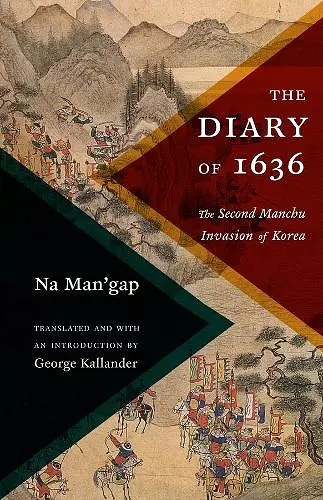The Diary of 1636
The Second Manchu Invasion of Korea
Na Man’gap author George Kallander translator
Format:Paperback
Publisher:Columbia University Press
Published:21st Aug '20
Should be back in stock very soon

Early in the seventeenth century, Northeast Asian politics hung in a delicate balance among the Chosŏn dynasty in Korea, the Ming in China, and the Manchu. When a Chosŏn faction realigned Korea with the Ming, the Manchu attacked in 1627 and again a decade later, shattering the Chosŏn-Ming alliance and forcing Korea to support the newly founded Qing dynasty.
The Korean scholar-official Na Man’gap (1592–1642) recorded the second Manchu invasion in his Diary of 1636, the only first-person account chronicling the dramatic Korean resistance to the attack. Partly composed as a narrative of quotidian events during the siege of Namhan Mountain Fortress, where Na sought refuge with the king and other officials, the diary recounts Korean opposition to Manchu and Mongol forces and the eventual surrender. Na describes military campaigns along the northern and western regions of the country, the capture of the royal family, and the Manchu treatment of prisoners, offering insights into debates about Confucian loyalty and the conduct of women that took place in the war’s aftermath. His work sheds light on such issues as Confucian statecraft, military decision making, and ethnic interpretations of identity in the seventeenth century. Translated from literary Chinese into English for the first time, the diary illuminates a traumatic moment for early modern Korean politics and society. George Kallander’s critical introduction and extensive annotations place The Diary of 1636 in its historical, political, and military context, highlighting the importance of this text for students and scholars of Chinese and East Asian as well as Korean history.
TheDiary of 1636 is a fascinating firsthand description of the turmoil and difficulties in Chosŏn during the second Manchu invasion. Kallander’s engaging and highly readable translation provides an understanding of the Chosŏn response to the invasions, internal power struggles, and consequences of this momentous event that reshaped the face of East Asia. -- Michael J. Pettid, coeditor of Premodern Korean Literary Prose
Na Man’gap’s vivid and detailed description of the Manchu invasion of Korea constitutes an essential work for anyone interested in Manchu-Korean relations. George Kallander’s expert translation and exhaustive introduction make The Diary of 1636 one of the most important primary sources available in English on early seventeenth-century Korean and East Asian history. -- Nicola Di Cosmo, translator of The Diary of a Manchu Soldier in Seventeenth-Century China
The Diary of 1636 offers a fascinating narrative of the military attack, traumatic experiences, humiliating defeat, surrender, and the post-invasion political circumstances. This excellent translation is a must-read for students and scholars working on Sino-Korean relations in the early modern period. -- Jisoo M. Kim, author of The Emotions of Justice: Gender, Status, and Legal Performance in Choson Korea
Kallander’s translation of Na Man’gap’s eyewitness account of the 1637 Manchu invasion of Korea opens a window into an important event in Korea history. Providing insight into the Chosŏn response, Na's diary shows the attempt to balance the loyalty to the Ming that Confucian ethics demanded with the recognition of the overwhelming strength of the invading Manchu forces that realism required. Truly required reading for the history of Korea’s Chosŏn dynasty. -- Don Baker, author of Catholics and Anti-Catholicism in Chosŏn Dynasty Korea
Providing access to an important text that gives us a sense of life at the frontline of one of the most devastating military invasions in Korea’s history, The Diary of 1636 is a vital text, highlighting a part of Korean history that has been neglected. -- Andrew David Jackson, Monash University
An interesting read not just as an eyewitness account of a major event in Korean history, but also for the introduction and notes by George Kallander. * London Korean Links *
Kallander’s translation will be a critical source for teaching and research in Korean and Northeast Asian history . . . He has also paved the way for future collaboration between scholars in Korean, Manchu, and Chinese studies through the reading and contemplation of accounts in multiple languages of this pivotal milestone in Northeast Asia’s early modern political development. * Sungkyun Journal of East Asian Studies *
The Diary of 1636 is a versatile text for research and—with its introduction and detailed annotations—for teaching. * Journal of Korean Studies *
ISBN: 9780231197571
Dimensions: unknown
Weight: unknown
360 pages